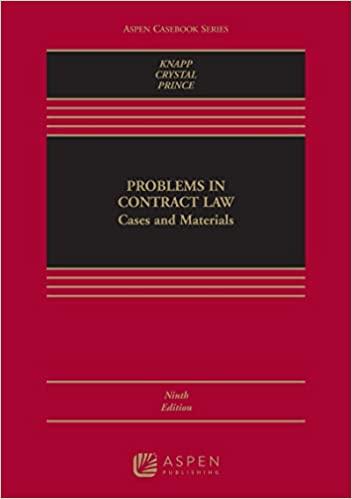Answered step by step
Verified Expert Solution
Question
1 Approved Answer
You must answer all parts of this question: (a)Theresa is a company director of Envir-On, an Irish company that manufactures electrical goods using environmentally friendly
You must answerallparts of this question:
- (a)Theresa is a company director of Envir-On, an Irish company that manufactures electrical goods using environmentally friendly processes and materials. Theresa signs a contract with Michel, who runs a national chain of electrical goods stores, to deliver 20,000 microwaves for sale in his stores. The contract requires that the goods meet all relevant standards under "Irish and European Union Law".
- Michel subsequently refuses to pay Theresa for the goods, claiming that the contract is void. When Theresa queries this, Michel refers to a (fictitious) EU Regulation (the "Regulation") which stipulates that "all goods manufactured and/or sold in the European Union must be energy efficient and have a minimal impact on the natural environment." Michel claims that the high-power consumption of the microwaves means they cannot possibly be considered "energy efficient" within the terms of the Regulation. Theresa disputes this, claiming that although the microwaves may have a high-power consumption, they satisfy the terms of the Regulation as they have been manufactured in an environmentally friendly manner.
- Theresa sues Michel for breach of contract in the Irish High Court (the court of "first instance" in Ireland). Theresa refers to a previous (fictitious) ruling by the Court of Justice of the European Union (CJEU) holding that certain petrol-fuelled cars are not prohibited under the terms of the Regulation, provided they are manufactured in a manner that produces a low environmental impact. Michel counters this by referring to national case law from Cyprus and Slovenia which appears to interpret the Regulation as referring to the day-to-day energy usage of goods.
Advise whether the Irish High Court should make a "Preliminary Reference" to the CJEU under the terms of Article 267 of the Treaty on the Functioning of the European Union (TFEU).
- (b)The High Court declines to make a preliminary reference to the CJEU and finds in Theresa's favour. Michel appeals the decision to the Irish Court of Appeal, which finds in his favour. Theresa then appeals this decision to the Irish Supreme Court (from which no further appeal is possible).
- Before hearings begin at the Supreme Court, Theresa and Michel reconcile and Michel agrees to fulfil his part of the contract. They are nevertheless keen for proceedings to continue as both are "interested in the outcome".
- Advise whether the Irish Supreme Court should make a reference to the CJEU under Article 267 TFEU.
Step by Step Solution
There are 3 Steps involved in it
Step: 1

Get Instant Access to Expert-Tailored Solutions
See step-by-step solutions with expert insights and AI powered tools for academic success
Step: 2

Step: 3

Ace Your Homework with AI
Get the answers you need in no time with our AI-driven, step-by-step assistance
Get Started


